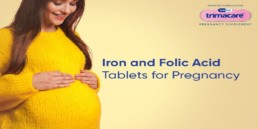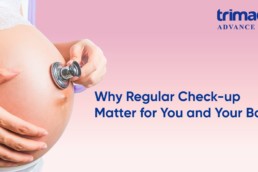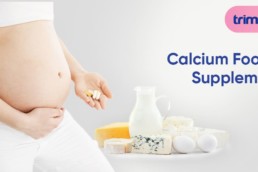Pregnancy is a beautiful journey which comes with significantly increased nutritional demand. During this time, a balanced diet is essential for the well-being of the mother and the baby. However, the traditional Indian diet lacks adequate nutrients that a body requires daily. This is where iron supplements and folic acid tablets play a vital role. Both iron and folic acid are essential nutrients that support the mother and the baby’s development.
In this blog, we will learn why iron and folic acid are essential during pregnancy and how they are beneficial.
Why Iron Is Important During Pregnancy?
Both iron and folic acid are crucial for pregnant women. Iron helps prevent serious disorders such as anaemia while supporting the baby’s growth and development. Listed below are some of the benefits of iron during pregnancy:
- Brain & Organ Development: Iron also plays a vital role in a baby’s brain and organ development ensuring the baby receives enough oxygen and nutrients.
- Haemoglobin Production: It plays a crucial role in producing haemoglobin which transports oxygen to both the mother and the baby.
- Supports Energy Levels: Iron helps prevent maternal fatigue and tiredness and ensures adequate oxygen circulation.
- Prevents Anaemia: Iron deficiency leads to anaemia that can cause complications during labour and delivery. Thus, taking iron tablets can mitigate anaemia.
Why Folic Acid Is Crucial During Pregnancy?
Folic acid plays a pivotal role in the formation of DNA and cell division for the baby’s development. It also helps produce red blood cells and prevents fatigue and anaemia. Being the most crucial nutrient during the first 4 weeks, folic acid helps form the neural tube to develop the foetus’s brain and spinal cord. Therefore, doctors prescribe folic acid tablets for pregnancy to eliminate such issues. Furthermore, listed below are some of the benefits of folic acid for the baby:
- Prevents Neural Tube Defects: Neural tube disorder is the most common birth defect affecting the spinal cord and brain of the baby. Taking iron and folic acid tablets before and during the 1st trimester helps reduce these risks.
- Supports Development & Growth: Folic acid is important for the growth of foetal tissue and organs and optimal placenta functioning.
- Reduced Risk of Complications: Adequate folic acid intake helps reduce the risk of low birth weight, preterm birth, cleft lip and palate, and other complications.
Natural Sources of Iron
- Lean Red Meat: Beef, lamb, and pork
- Poultry: Chicken and turkey
- Seafood: Shellfish (clams, oysters, & mussels), salmon, tuna, sardines
- Plant-based: Spinach, kale, collard greens, Swiss chard, lentils, peas, tofu, tempeh, quinoa, and fortified cereals.
- Nuts & Seeds: Pumpkin seeds, sesame seeds, hemp seeds, cashews, almonds, and peanuts
- Dried Fruits: Dried apricots, prunes, raisins, and dried figs
- Whole Grains: Oats, whole wheat, buckwheat, and brown rice
- Fortified Foods: Several breakfast cereals
- Vitamin C Foods: Oranges, strawberries, kiwi, bell peppers, and broccoli
However, if adding these items to your diet fails to provide enough Iron, the doctors might suggest iron supplements to meet the daily required amount.
Natural Sources of Folic Acid
- Leafy Green Vegetables: Spinach, kale, Swiss chard, collard green, turnip greens
- Fortified Cereals: Breakfast cereals with whole-grain options
- Citrus Foods: Oranges, grapefruits, lemon, limes, and tangerines.
- Legumes: Lentils (green, brown, or red), chickpeas, black beans, pinto beans, and kidney beans
- Nuts & Seeds: Sunflower Seeds, peanuts, and almonds
- Whole Grains: Quinoa, brown rice, barley, and whole wheat bread.
- Avocados
- Asparagus
- Broccoli
- Beets
- Eggs
- Tomatoes
- Papaya
- Brussels sprouts
However, if adding these items to your diet fails to provide enough folate, the doctors might suggest folic acid tablets to meet the daily required amount.
Why Choose Trimacare™ Iron and Folic Acid Tablets in Pregnancy?
Iron and Folic Acid are essential nutrients for a healthy pregnancy. They help support the overall health of the mother and the baby and mitigate the risk of developing health disorders and maternal fatigue. Trimacare™ is enriched with iron, folic acid, and other 20+ essential nutrients to support healthy pregnancy. Trimacare™ Iron supplements for women are formulated under the supervision of India’s leading medical professionals and follow the WHO and the ICMR guidelines. The iron tablets for women help support a healthy pregnancy and development of the baby while reducing maternal fatigue.
Conclusion
Iron and folic acid are the two most essential nutrients required during pregnancy. Iron helps transport oxygen and reduce the risk of anaemia. Folic acid is important for the optimal development of the baby’s brain and spinal cord. Deficiency of one or both can cause serious complications including anaemia, preterm birth, low birth weight, etc.
Having a nutrient-rich diet during pregnancy is essential, but the regular Indian diet lacks adequate nutrients. Thus, choosing iron and folic tablets in pregnancy can benefit women for a healthy pregnancy.
FAQs
1. Do I need to take folic acid if I already eat food that contains folate?
Yes, you still need to take folic acid tablets.
2. Why do I need a folic acid tablet before getting pregnant?
Folic acid helps develop the neural tube during the 1st month of the pregnancy, which forms the brain and spinal cord of the baby.
| Phases | Daily Micrograms |
| Before or could get pregnant | 400 |
| Pregnant | 600 |
| Baby with neural tube defect | 4000 |
How much iron do I need daily during pregnancy?
You need to consume about 27 mg of iron daily during pregnancy.
3. What are the natural sources of iron and folic acid?
Leafy greens, nuts, seeds, citrus fruits, poultry, seafood, tomatoes, papaya, broccoli, avocadoes, etc.
A Certified Nutritionist with a rich healthcare background in health journalism, the author has immense experience in curating reader-friendly, engaging, and informative healthcare blogs to empower readers to make informed pregnancy-related decisions.











